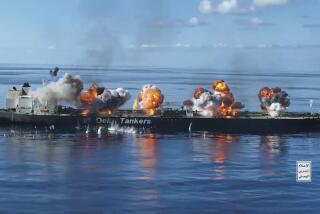Navy SEALs seize tanker in illegal sale of Libyan oil
- Share via
CAIRO — Did a charismatic Libyan rebel chieftain with big ambitions overreach?
Trying to put a $36-million cargo of crude oil on the black market was an extraordinarily bold move by Ibrahim Jathran, a militia commander whose fighters played a role in the NATO-backed rebellion three years ago against longtime dictator Moammar Kadafi.
In the early hours Monday, Jathran lost his gamble when U.S. Navy SEALs seized control of the tanker Morning Glory, which sailed a week ago from an oil port in eastern Libya. Jathran’s forces had captured the terminal more than six months earlier as part of a broader bid for greater regional independence — and a bigger share of oil revenue.
The U.S. raid, staged at sea about 15 miles south of the Cypriot coast, came at the behest of the governments of Libya and Cyprus, the Pentagon said in a statement. President Obama personally approved the operation.
“No one was hurt tonight when U.S. forces … boarded and took control of the commercial tanker Morning Glory,” the statement said. The SEAL team, backed by helicopters, launched the overnight raid in international waters from the guided-missile destroyer Roosevelt, U.S. military officials said.
The team of SEALs that boarded the ship was “unopposed” and no shots were fired during the operation, said two military officers briefed on the details. They requested anonymity because they were not authorized to comment publicly. Three Libyans were taken into custody and will be turned over to Libyan authorities, they said.
“They did not resist,” one of the military officers said of the Libyans, though two AK-47s were found.
The officials refused to say how the SEALs got aboard the tanker or how many commandos were involved, but one said the figure was between 10 and 50.
After securing the tanker, the SEALs were replaced by 25 sailors from the nearby guided-missile destroyer Stout, who are assisting the tanker’s 21-member crew in taking the vessel back to a Libyan port, a voyage expected to take three to four days.
The episode marked the latest chaotic turn of events for Libya, which has been beset by turmoil in the post-Kadafi era. A weak central government has been struggling to maintain some semblance of control, while armed groups, some of them tribally based, have surged in the power vacuum, some loosely allying themselves with the government and others challenging it.
Jathran’s militia is among the most high-profile in Libya. He set up what was intended to be a de facto government in the country’s oil-rich east. But the rebel blockade of key ports and the seizure of oil installations have reduced crude output to a trickle, causing more hardship in an already-impoverished region as revenue from the capital, Tripoli, also dried up.
Adding to the sense of crisis, a car bomb exploded Monday outside a military academy in the eastern city of Benghazi, killing at least seven newly minted officers and guests after a graduation ceremony. Military installations and personnel have become a prime target around Benghazi, scene of a notorious attack 18 months ago on a U.S. diplomatic compound, in which American Ambassador J. Christopher Stevens was killed.
The North Korean-flagged tanker’s departure from the port of Es Sider came in defiance of ineffectual threats from Libya’s beleaguered prime minister, Ali Zeidan. After repeatedly declaring that he would deploy armed forces to prevent the vessel from setting sail, Zeidan was ousted by lawmakers hours after it left port last week.
His defense minister, Abdullah Thinni, stepped in as his interim replacement. Zeidan, who fled the country, said the parliamentary move against him was invalid.
Libya’s leadership may now face a backlash for seeking U.S. help in dealing with the oil theft. A furor erupted in October when American commandos slipped into Tripoli and seized a senior Al Qaeda member known as Abu Anas al Liby. At the time, the Libyan government publicly demanded an explanation and called the capture a “kidnapping.”
But with Libya’s vast oil reserves virtually its only national asset, and with those riches tied up in a web of international financial obligations, the government had little choice. The official news agency LANA reported the tanker raid simply by citing the Pentagon statement, without any immediate comment from Libyan officials as to what they knew and when.
A few hours before the SEALs operation was announced, Libya’s justice minister made comments that seemed aimed at preparing the public for the news. The minister, Salah Merghani, told journalists in Benghazi that the tanker’s journey was being closely monitored and that the U.S. and the European Union were “clear in their stance” that the rebels’ attempted oil sale went against international law.
The tanker was being returned to Libya, the Pentagon said, presumably to a port under the control of government forces. North Korea said the vessel bore its flag in error and said it had no connection with its owners, thought to be in Egypt or one of the Persian Gulf states.
Times staff writer David S. Cloud in Washington and special correspondents Amro Hassan in Cairo and Mohamed Juma in Benghazi contributed to this report.
spondents Amro Hassan in Cairo and Mohamed Juma in Benghazi contributed to this report.
More to Read
Sign up for Essential California
The most important California stories and recommendations in your inbox every morning.
You may occasionally receive promotional content from the Los Angeles Times.









